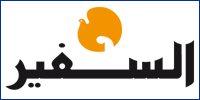As-Safir
Defunct Lebanese newspaper (1974–2016) From Wikipedia, the free encyclopedia
As-Safir (Arabic: السفير, lit. 'The Ambassador') was a leading Arabic-language daily newspaper in Lebanon. The headquarters of the daily was in Beirut.[1] It was in circulation from March 1974 until December 2016.[2] The last issue of the paper was published on 31 December 2016. The online version was also closed on the same date.[2]
 | |
 As-Safir front page, 16 April 2013 | |
| Type | Daily newspaper |
|---|---|
| Format | Broadsheet |
| Publisher | Dar Al Safir |
| Editor | Talal Salman |
| Founded | 26 March 1974 |
| Political alignment | Arab nationalism Pan-Arabism Anti-Zionism Anti-imperialism Pro-March 8 Alliance |
| Language | Arabic |
| Ceased publication | 31 December 2016 |
| Headquarters | Beirut, Lebanon |
| Website | www |
Aimed at political coverage, As-Safir dubbed itself the "Voice of the Voiceless", serving as a key news source for Lebanese in the Arab world. It espoused Arab nationalism and supported the Palestinians, aligning with the March 8 Alliance. Its rival an-Nahar is associated with the March 14 alliance.[3]
History and profile
As-Safir was first published by Talal Salman on 26 March 1974 as an Arabic political daily.[4][5] Talal Salman also served as chief editor of the paper.[6] Bassem Sabeh was the chief editor of the paper between 1980 and 1990.[7] In 2005, the daily's chief editor was Joseph Samaha.[8][9] The publisher of the daily which was published in broadsheet format was Dar Al Safir.[1][10]
One of the early contributors was Palestinian cartoonist Naji Al Ali.[11] Another contributor was Samir Frangieh.[7]
On 18 July 2011, the paper, together with Al Akhbar, another daily published in Lebanon, was banned in Syria.[12]
As-Safir had a weekly page on the environmental issues.[13]
Political approach
As-Safir stated its mission as to be "the newspaper of Lebanon in the Arab world and the newspaper of the Arab world in Lebanon."[14] This remained the slogan printed on the paper's masthead.[5] It also adopted the slogan "The voice of voiceless". The paper provided an independent voice for the left-wing, Pan-Arab tendency which was increasingly active in Lebanese intellectual and political life in the years after the Arab defeat in the Six-Day War.[15] It also focused on issues pertaining to the Muslim world, advocated Arab nationalism, was close to Hezbollah and had a pro-Syrian stance.[16]
Another Lebanese daily, An-Nahar, was cited as the biggest rival of As-Safir.[17] In the mid-1990s, the paper was described as a left-of-center paper, whereas An-Nahar as a right-of-center paper.[18] During the same period, As-Safir was also described by Robert Fisk as a Syrian-backed newspaper.[19] In the 2000s these papers were supporters of two opposite poles in Lebanon, in that An-Nahar supported March 14 alliance, whereas As-Safir supported March 8 alliance.[20]
Circulation and websites
As-Safir had the second highest circulation in Lebanon in the 1990s after An-Nahar.[18] Its circulation was 45,000 copies in 2003, making it the second best selling paper in Lebanon.[10] The paper sold more than 50,000 copies in 2010.[21] In 2012, the Lebanese Ministry of Information reported that the daily had a circulation of 50,000 copies.[4][20][22] The circulation of the paper was less than 10,000 copies in 2016 when it folded.[21]
In addition to its Arabic website, the paper had also an English website.[23] The paper's online version was the 16th most visited website for 2010 in the MENA region.[24]
See also
References
External links
Wikiwand - on
Seamless Wikipedia browsing. On steroids.
